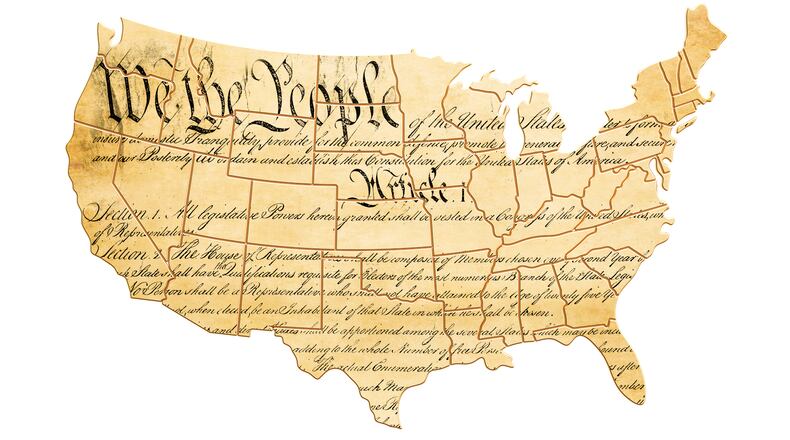But the more I saw, heard and read about this conflict, the more I opposed what our military was doing as determined by President Lyndon B. Johnson and Secretary of Defense Robert McNamara.
I respected draftees going off to battle, but hundreds of thousands were dying for no real gain or purpose. We scorched the Earth and innocent people with Napalm and Agent Orange. I felt it was my patriotic duty to oppose that war. “America, love it or leave it,” posed a false dichotomy.
Today we face other situations that test our understanding of the term, including our continued presence in Iraq and Afghanistan, where the U.S. tries to prop up minimally democratic governments that struggle with corruption, violence, poverty and civil unrest. We are also dealing with more civil unrest in our own country than we have seen in decades regarding our elections, the transfer of power, and equal opportunity and justice under the law.
So what is a patriot to do?
Here are a few answers to consider.
Patriots study our nation’s history. They take pride in our accomplishments, name our shortcomings and avoid repeating tragedies. Patriots also stay in touch with current events and educate themselves about the issues that face us. As they take a stand, they attempt to listen to and respect the other side. They are willing to alter their opinions as they gather more information.
Patriots seek the whole truth of any complex situation and realize their own biases based on upbringing, past experience, or lack of interaction with those who are different.
American patriots support freedom of speech, press and religion. If they are people of faith who follow a particular religion, they realize the impact that religion has on forming their political beliefs while maintaining the separation of church and state.
They know of the struggle between good and evil, both within themselves and within the larger society. They favor the common good for the greatest number of people, not just their own particular needs.
Patriots realize the proper place of our military in a multidimensional, often dangerous world and support our volunteers who are willing to lay down their lives for their country. At the same time they evaluate very carefully any government decision to take military action.
They cherish human rights both here and abroad, especially in the countries we support economically, politically and militarily. Patriots respect the rule of law and demand equal treatment under the law for everyone. They value our policemen and women while holding them accountable for how they do their jobs as public servants.
Patriots understand our system of government — local, state and national. They vote in free, fair and accurate elections after educating themselves on the issues and the candidates. They sometimes go beyond voting and do service in their communities to lift others up.
They embrace the definition of patriotism ― ”devotion to and vigorous support for one’s country” ― because they actively participate in our democracy, respect our Constitution, and promote liberty and justice for all.
FROM FACEBOOK
“On it’s own, it’s as meaningless as ‘love’ or ‘honor.’ They are entirely dependent on who’s saying them. John Lennon preached love. So did Charles Manson. So did Jesus. Mussolini preached patriotism. So did Teddy Roosevelt. Too fungible a word to be useful for actual people. In some ways it’s like a shiny buzzword like ‘proactive’ or ‘synergy.’ It’s just been around longer.” ― Joel Moss Levinson
“As retired military I see the word ‘patriot’ through a few different lenses. Yes the definition is someone who supports their country and defends it against enemies, but the word’s history is interesting and various groups try to claim ownership and use of its meaning. They use it to draw lines in the sands and seed division.” ― Melissa Rodriguez.
“Patriot reminds me of the phrase, “’f you have to say you are a ‘Lady’, you aren’t.’ ― Janelle Wood
“One who does his or her part to make sure this country lives up to its purported values.” ― Jared Grandy
“Knowing that the U.S. Constitution is the basis of our government, not a political party and certainly not one individual.” ― Roberta Loman
“Looking out for each other and making sure everyone has access to basic needs.” ― Amanda Cahill
“A patriot is one who will run, not walk, when help is needed, stand and salute the flag when the anthem is played and treat others as you demand to be treated.” Susan Hanley
“The desire for your country to always striving to be better. Always learning, always growing, always moving forward, always doing good.
My ancestor wrote the National Anthem. I was raised to be proud of that but as I got older I thought about the second verse and knew in my heart it was wrong (reference to slavery). When Kaepernick started kneeling, I didn’t see it as disrespectful. I saw it as we still have much further to go.
I also see kneeling as a humble stance of pleading for something to be better, rather because of faith or a plea for mercy.
Being a patriot doesn’t mean we ignore our flaws. It means we do our best to work them out for all of our citizens and neighbors. Patriotism is being proud of your country for what is already is, but humble because of how much better it can be for everyone.” ― Angela Key Bailey
Jim Brooks is an English teacher and tennis coach.
About the Author

